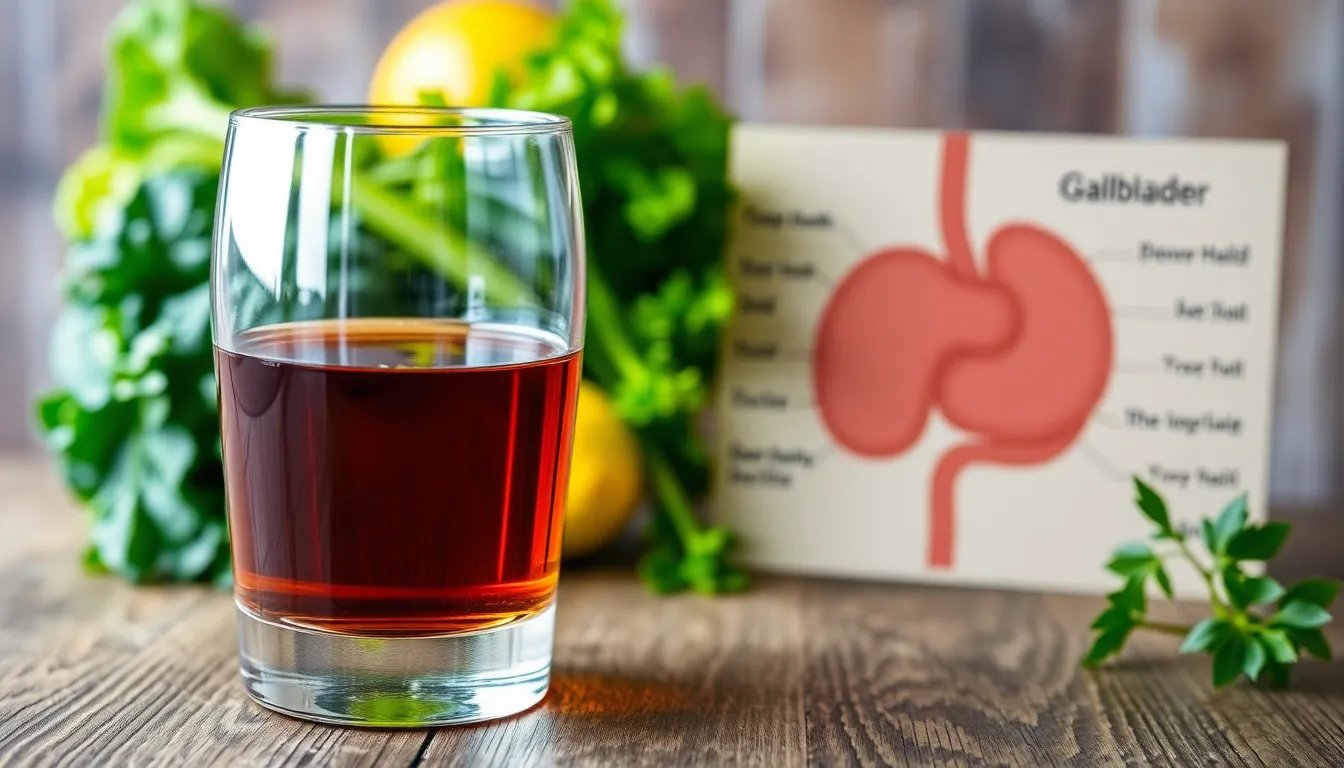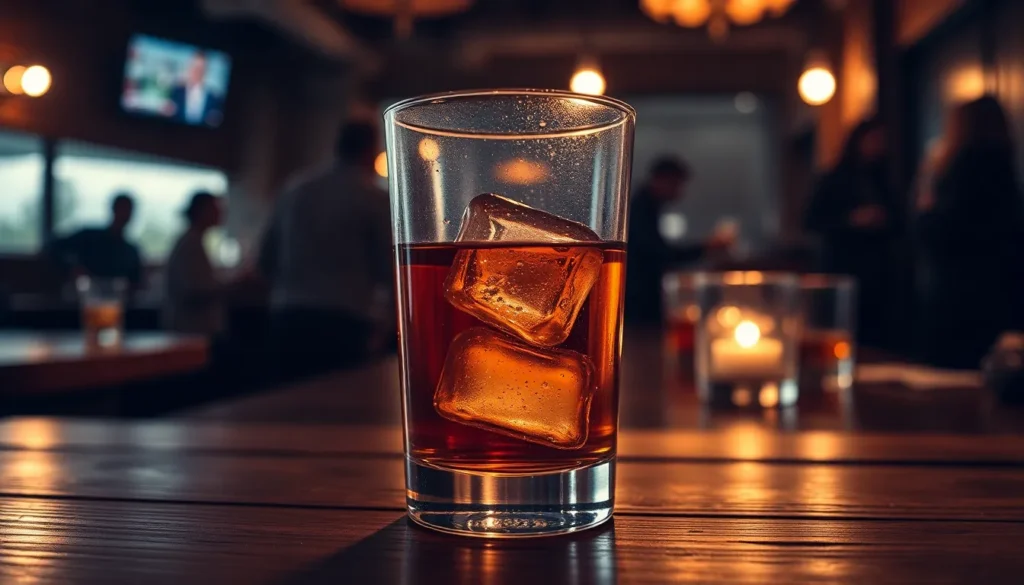Table of Contents
ToggleGallbladder pain can feel like a surprise party gone horribly wrong—unexpected and downright unpleasant. For many, the question looms: does alcohol crash the party and make things worse? With every sip of that frosty beverage, the stakes rise.
While a casual drink might seem harmless, alcohol can stir up trouble for the gallbladder, especially for those already dealing with discomfort. Picture this: your gallbladder is like a cranky roommate who hates loud music. Add alcohol to the mix, and it’s like blasting the stereo at full volume. The results? A night of regret and a painful morning after.
Understanding Gallbladder Pain
Gallbladder pain originates from various underlying issues. Alcohol consumption may aggravate these pains and lead to further complications.
Common Causes of Gallbladder Pain
Gallstones frequently trigger gallbladder pain. These hardened deposits form when bile contains excessive cholesterol or bilirubin. Inflammation of the gallbladder, known as cholecystitis, also plays a significant role in discomfort. Bile duct obstruction can worsen symptoms as well. Additionally, pancreatitis may accompany gallbladder problems, resulting in intensified sensations of pain.
Symptoms of Gallbladder Issues
Pain in the upper right abdomen stands as a primary symptom of gallbladder issues. Nausea and vomiting often accompany this discomfort. Bloating tends to occur after meals, especially fatty ones. Patients may notice jaundice, leading to yellowing of the skin or eyes. Fever can signal inflammation or infection within the gallbladder. Each symptom requires attention to determine the severity of the condition.
The Role of Alcohol in Digestive Health

Alcohol consumption poses significant implications for digestive health, particularly regarding the gallbladder. Individuals often experience heightened discomfort when they drink, especially if they suffer from underlying gallbladder conditions.
How Alcohol Affects the Gallbladder
Alcohol affects gallbladder function by increasing bile production. An influx of bile may lead to irritation, particularly for those with existing gallbladder issues. It can also contribute to inflammation, making gallbladder pain more severe. Discomfort often arises in the upper right abdomen following alcohol intake, indicating potential complications. Understanding these effects informs better dietary choices for those with gallbladder conditions.
Potential Risks of Alcohol Consumption
Alcohol consumption poses several risks for those with gallbladder pain. Regular intake can trigger gallstone formation, leading to painful episodes. It may also exacerbate inflammation in conditions like cholecystitis. Risk factors increase for individuals with pre-existing gallbladder problems. Chronic consumption can lead to serious complications, necessitating medical evaluation. Recognizing these risks encourages individuals to reconsider their drinking habits in the context of their digestive health.
Research on Alcohol and Gallbladder Pain
Research indicates a significant connection between alcohol consumption and worsened gallbladder pain. Alcohol can irritate the gallbladder, exacerbating discomfort and compounding existing issues like gallstones or cholecystitis.
Recent Studies and Findings
Recent studies highlight the adverse effects of alcohol on gallbladder health. Research published in reputable medical journals shows that individuals consuming alcohol frequently experience increased symptoms of gallbladder disease. A study revealed that moderate to heavy drinkers encountered pain episodes more often than non-drinkers. Other findings suggest that alcohol may stimulate bile release during digestion, which can aggravate gallbladder conditions. Data suggests that the risk of developing gallstones rises with higher alcohol intake, indicating a direct link between consumption levels and gallbladder health.
Expert Opinions on Alcohol Consumption
Expert opinions emphasize caution regarding alcohol and gallbladder issues. Gastroenterologists frequently advise patients to limit or avoid alcohol altogether. They argue that even small amounts of alcohol might worsen pain and inflammation. Some experts note that alcohol can lead to bile duct obstruction, worsening complications in those with pre-existing gallbladder conditions. Recommendations often include dietary changes alongside reduced alcohol intake for improved digestive health. Given the potential for alcohol to trigger symptoms, health professionals stress the importance of awareness and proactive management.
Coping Strategies for Gallbladder Pain
Managing gallbladder pain involves implementing effective coping strategies. Dietary changes and lifestyle modifications play vital roles in alleviating discomfort.
Dietary Changes
Incorporating low-fat foods into daily meals can ease gallbladder stress. Emphasizing fruits, vegetables, and whole grains provides essential nutrients without overwhelming the gallbladder. Consuming smaller, more frequent meals helps maintain stable digestion. Avoiding fried foods and processed snacks reduces the risk of triggering gallbladder symptoms. Staying hydrated with water supports overall digestive health and bile production. Limiting alcohol intake is crucial, as even small amounts can heighten pain. Focusing on high-fiber foods promotes regular digestion and lessens strain on the gallbladder.
Lifestyle Modifications
Engaging in regular physical activity improves overall digestive function. Incorporating moderate exercises, such as walking or cycling, supports gallbladder health. Managing stress through mindfulness practices, like yoga or meditation, contributes positively to digestive well-being. Prioritizing sleep enhances body recovery and reduces overall pain sensitivity. Avoiding smoking remains essential, as it compounds digestive problems. Maintaining a healthy weight helps mitigate gallbladder stress and associated pain. Regular check-ups with healthcare providers ensure ongoing management and support for gallbladder health.
Alcohol’s impact on gallbladder pain is significant and shouldn’t be overlooked. For individuals experiencing gallbladder issues, even moderate drinking can lead to increased discomfort and complications. The connection between alcohol consumption and gallbladder health is clear, highlighting the need for caution.
By adopting healthier lifestyle choices and being mindful of alcohol intake, individuals can better manage their symptoms and improve their overall digestive health. Prioritizing dietary changes and regular check-ups with healthcare providers can make a considerable difference in managing gallbladder pain effectively. Taking proactive steps can lead to a healthier, more comfortable life.




